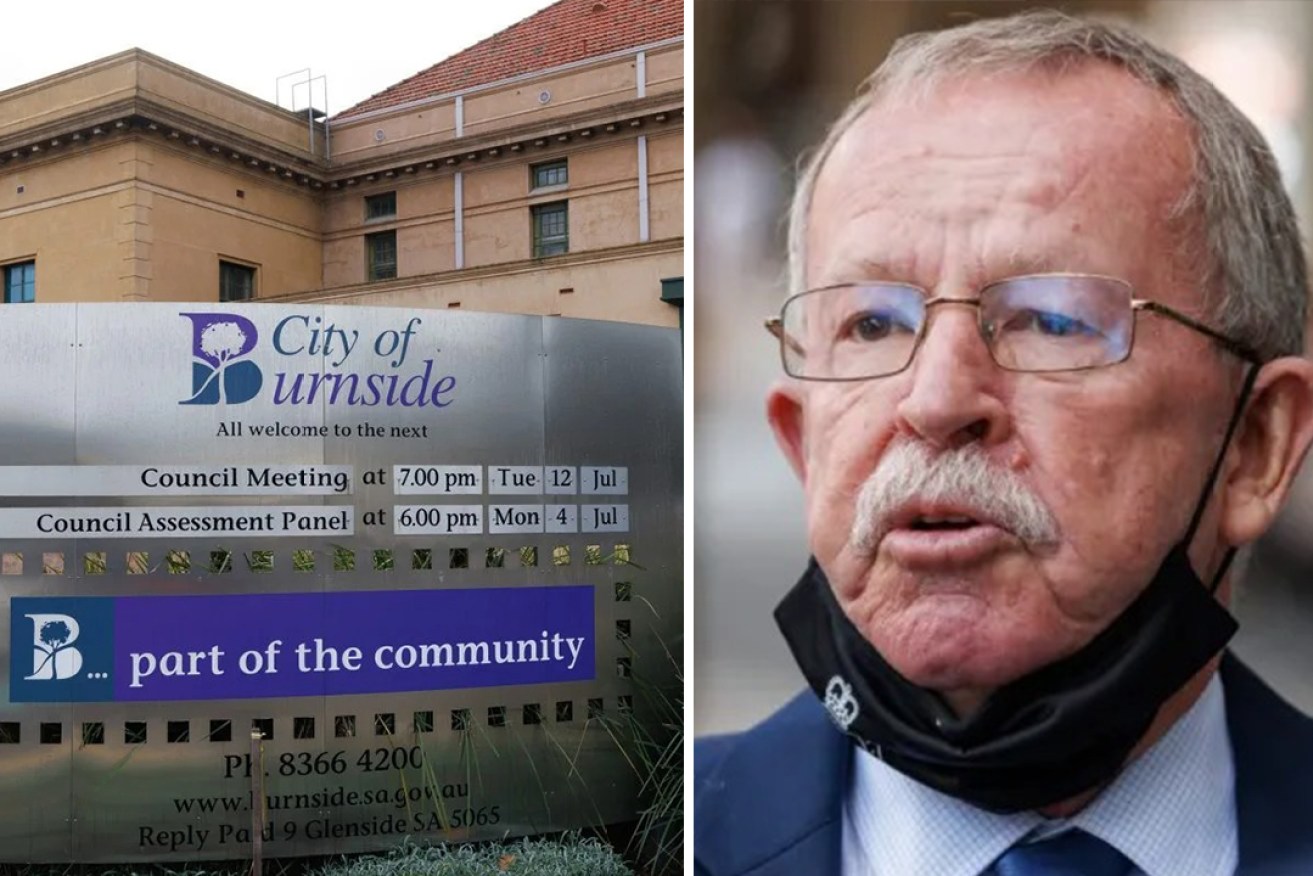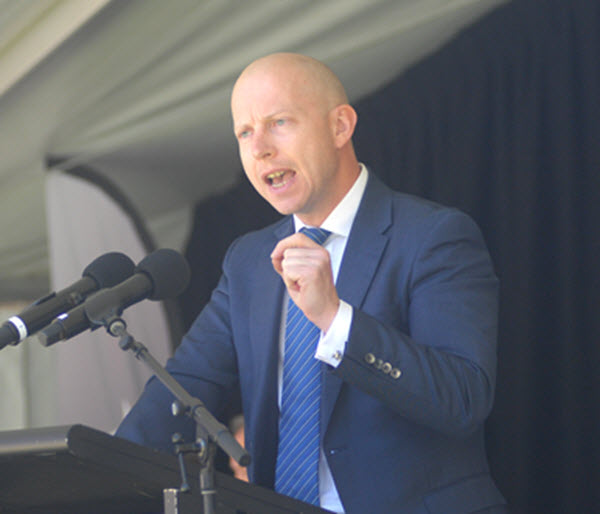Minister hits back after council blasts ‘waste of ratepayers’ money’ scheme
Local Government Minister Geoff Brock has rebuked a council CEO who ridiculed a new law requiring councils to pay $45,000 for “advice” about rates and spending, saying his “strident” commentary “does not constitute thoughtful and evidence-based policy development”.


Local Government Minister Geoff Brock and the City of Burnside are disputing the merits of a government-mandated "advice scheme". Photos: Tony Lewis/InDaily
City of Burnside CEO Chris Cowley wrote to Brock in December to express his frustration about an Essential Services Commission of SA (ESCOSA) scheme requiring the state’s 68 councils to pay more than $45,000 each for “advice” from the Commission about the “appropriateness of council’s long-term financial plans”.
ESCOSA and the councils are required by legislation to publish the advice once finalised, although ESCOSA cannot compel councils to follow the advice.
The aim of the scheme, according to ESCOSA, is to “give ratepayers confidence that the rates they pay are set at the level necessary for their council to provide the services they value”.
But Cowley urged Brock to reconsider the scheme, telling the minister that it is “ill conceived, a waste of ratepayers’ money” and a “complete waste of our council staff and resources”.

City of Burnside CEO Chris Cowley, formerly CEO of the City of Whyalla. Photo: supplied
He also criticised the scope and type of advice councils would receive from ESCOSA as “basic” and “blatantly obvious”.
“The irony is not lost on us that this ‘Advice Scheme’ which ostensibly is about curbing council spending to keep costs in check and limit rate rises, will have the opposite effect,” Cowley wrote on December 2.
“There will be more costs to Council (paid to ESCOSA) that achieves nothing but taking funds from Council’s bottom line that should be directed to our programs and services for ratepayers.”
City of West Torrens CEO Terry Buss submitted the same view in a similarly worded letter to Brock in November, while the Local Government Association of South Australia (LGA) has also expressed “reservations” to ESCOSA about the scheme.
But Brock has rejected Cowley’s criticisms and made clear to both councils that the program – introduced as part of the Marshall Government’s local government reforms in 2021 – will go ahead as planned.
In a letter to Burnside mayor Anne Monceaux on January 10, Brock said ESCOSA’s advice “should – in fact – provide a level of comfort both to the Council and its community that their municipal services are being managed well”.
“Mr Cowley’s letter makes very clear his opposition to the Scheme, and is strident in asserting his reasons for that opposition,” Brock wrote.
While the commentary – and the tone of the letter itself – might read well in the media, it does nothing to lend confidence that the content of the letter is well considered.
“However, Mr Cowley also advises me that ‘the City of Burnside strongly’ urges reconsideration of the requirement for the Scheme.
“This is prior to any evidence that the Scheme does not work (given it is still being implemented), nor evidence that the newly elected members of the Council had resolved to hold such a definitive policy position.
“While the commentary – and the tone of the letter itself – might read well in the media, it does nothing to lend confidence that the content of the letter is well considered.”
Brock further questioned whether Cowley’s letter represented the views of Burnside Council.
The minister wrote that his departmental officers “have not been able to provide to my office any prior examples of such strident views being expressed by the Council (in its previous term) during the consultation on the legislation that established the Scheme”.
“Yet I am in receipt of a letter from Mr Cowley, purporting to be writing on behalf of the Council, urging that I reconsider a Scheme that was initiated by the previous State Government and passed by both Houses of the South Australian Parliament in a form that responded to significant feedback from the local government sector,” Brock wrote.
“Making policy decisions is one of the key roles of the Council. However, Mr Cowley’s commentary does not constitute thoughtful and evidence-based policy development.
“It is also not a good example of open and transparent decision-making.
“There is no evidence that the ratepayers and the elected members of the Council have been given the opportunity to see a well-argued case either against or for the Scheme so that elected members might come to a considered decision on this matter that reflect your community’s views.”
InDaily sought a response from Cowley and was told he had nothing further to add to his previous comments.
However, a council spokesperson highlighted a motion passed by Burnside councillors at their most recent council meeting on January 24.
The motion, passed unanimously, authorises the mayor to write to Brock to express “concern around the ‘Local Government Advice Scheme’ with respect to the cost pressure it puts on Council compared to the value it provides to the ratepayers”.
The successful motion also expresses “support for the CEO’s letter to the Minister dated 2 December 2022 urging reconsideration of the requirement for the Scheme”.
The row comes as ESCOSA prepares to provide its first round of financial advice to councils on February 28.
The City of Burnside is one of 15 South Australian councils taking part in the first year of the four-year advice scheme.
ESCOSA, which says it is not resourced to carry out the program, initially estimated the cost of the program over four years to be $3,545,001 ($52,133 per council).
In August 2022, the cost was revised to $3,227,697 ($47,466 per council). ESCOSA CEO Adam Wilson told InDaily the commission will “consider the cost issue and will finalise that once the first round of advice is completed”.
Under the reforms passed in 2021 to the Local Government Act 1999, ESCOSA is allowed to charge council for all costs “reasonably incurred” in undertaking the advice scheme.
LGA CEO Clinton Jury told InDaily the scheme could force some councils to increase rates to cover their costs to ESCOSA.
“Many SA councils are concerned the current scheme has blown out beyond the original intention of the SA Parliament, and it is likely ESCOSA will provide advice on issues which councils already routinely consider and publish,” Jury said in a statement.
“The LGA shares the concerns of our members about the costs to councils as set by ESCOSA, and the additional value to councils and ratepayers. The LGA has made submissions to ESCOSA expressing these reservations.
“What we don’t want to see is advice being provided to councils that adds no value and comes at an excessive cost – particularly as councils already independently audit their Long-Term Financial and Infrastructure and Asset Plans.
“In some cases, this may force councils to increase rates to cover ESCOSA’s costs.”
In his letter to the Burnside mayor, Brock wrote: “I have noted Mr Cowley’s commentary, but I will await the outcome and the experience of the Scheme operating as the Parliament intended prior to considering whether changes are warranted and deserving of future consideration by the Parliament.”
“Nonetheless – and to emphasise – I appreciate constructive and reasoned feedback and advice about how legislated, whole-of-sector mechanisms function to assist and benefit councils to work for the betterment of their communities.”




